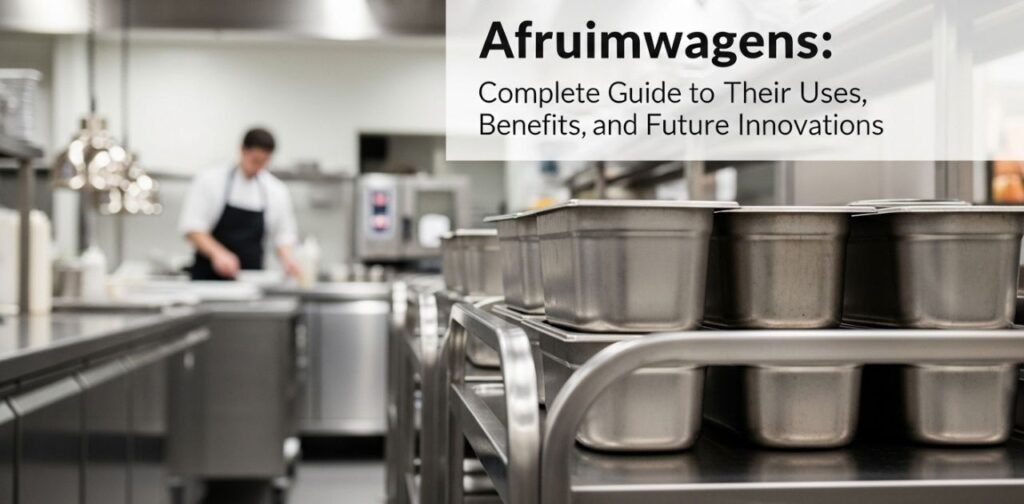Introduction
In agriculture, construction, and industrial logistics, efficiency is everything. Farmers, contractors, and transporters rely heavily on specialized equipment to streamline processes, reduce manual labor, and save time. One such piece of machinery is the Afruimwagen.
Afruimwagens—literally translated from Dutch as “clean-up wagons” or “scraper wagons”—play a crucial role in moving, collecting, and transporting large volumes of materials. Whether it’s harvested crops, construction debris, soil, or industrial waste, these wagons are designed for durability, capacity, and versatility.
In this article, we’ll explore what Afruimwagens are, how they are used, their advantages, types, and the future of this equipment. We’ll also look at frequently asked questions and give practical insights into why Afruimwagens are considered indispensable across multiple industries.
What Are Afruimwagens?
An Afruimwagen is a specialized wagon or trailer, usually attached to a tractor or heavy vehicle, designed to collect and transport bulk materials. Unlike regular trailers, Afruimwagens are built for high-volume, heavy-duty applications.
Key characteristics include:
- Large load capacity for transporting crops, soil, sand, manure, or rubble.
- Durable build quality using reinforced steel or specialized materials to handle rough usage.
- Hydraulic or mechanical systems for lifting, tilting, or unloading.
- Adaptability across industries such as agriculture, construction, and waste management.
In farming, for example, Afruimwagens are often used during harvest to transport potatoes, sugar beets, or silage from the field to storage or processing facilities. In construction, they may carry sand, gravel, or demolition waste. Their versatility makes them a vital part of modern logistics chains.
Importance of Afruimwagens in Agriculture and Industry
Afruimwagens have become a backbone of mechanized efficiency, particularly in regions where labor costs are high and speed is essential. Here’s why they matter:
- Boosting Productivity
Instead of relying on multiple small trips, Afruimwagens allow farmers or contractors to transport large volumes in one go, significantly reducing time and fuel costs. - Reducing Manual Labor
Manual loading and transporting are labor-intensive and slow. With hydraulic unloading systems, Afruimwagens make the process far easier and safer. - Cost Efficiency
While the initial investment in an Afruimwagen can be significant, the long-term savings on labor, time, and fuel make them a cost-effective solution. - Adaptability Across Materials
From agricultural crops to construction waste and industrial goods, Afruimwagens are not limited to a single sector. Their design allows for diverse applications. - Sustainability
Modern Afruimwagens are being designed with eco-friendly materials and energy-efficient hydraulics, aligning with global efforts to reduce environmental impact.
In short, Afruimwagens are essential because they strike the perfect balance between capacity, efficiency, and adaptability, making them invaluable in multiple industries.
Types of Afruimwagens
Different industries require different wagon types, and manufacturers have developed several variations of Afruimwagens to meet specific needs.
1. Agricultural Afruimwagens
- Used for crops like potatoes, beets, corn, or silage.
- Often include gentle unloading systems to avoid damaging crops.
- May have high walls and reinforced bases to handle heavy harvests.
2. Construction Afruimwagens
- Built with reinforced steel frames to transport sand, gravel, concrete, or debris.
- Often feature hydraulic tipping systems for quick unloading.
- Designed for rough terrains and heavy-duty use.
3. Industrial/Waste Management Afruimwagens
- Used for clearing and transporting waste, recycling materials, or bulk industrial goods.
- Can be adapted for container systems.
- Often comply with environmental safety standards.
4. Custom Afruimwagens
- Tailored for specialized industries.
- May include advanced features like GPS tracking, IoT sensors, or automated unloading.
Each type shares the same fundamental purpose—efficient transport and clearing—but differs in build, size, and features to match its application.
Advantages of Using Afruimwagens
Afruimwagens provide numerous benefits that explain their widespread use:
- Time-Saving: Large loads mean fewer trips, saving hours of work daily.
- Durability: Built to withstand tough working conditions.
- Versatility: One wagon can often handle multiple materials.
- Efficiency: Hydraulic systems simplify loading/unloading.
- Reduced Costs: Lower labor and fuel requirements over time.
- Safety: Less manual handling reduces workplace injuries.
For farmers, contractors, and industrial managers, these advantages directly translate to higher productivity and profitability.
The Future of Afruimwagens: Innovation and Sustainability
Like many industries, the manufacturing of Afruimwagens is undergoing innovation to keep up with modern demands. Here are some trends shaping their future:
- Automation and Smart Technology
Afruimwagens may soon feature self-loading or autonomous driving capabilities, reducing dependency on human operators. - IoT Integration
Smart wagons equipped with sensors can track load weight, efficiency, and fuel usage, helping companies optimize operations. - Eco-Friendly Designs
Manufacturers are exploring lighter, stronger, and more recyclable materials to reduce environmental footprints. - Hybrid and Electric Models
Just as tractors and trucks are moving toward electrification, Afruimwagens may follow suit with electrically powered hydraulic systems. - Custom Industry Solutions
The future will likely bring more tailored designs for specific crops, construction projects, or waste management requirements.
Afruimwagens are no longer just “wagons”—they are becoming high-tech, sustainable logistics solutions.
FAQs About Afruimwagens
1. What does the term Afruimwagen mean?
Afruimwagen is a Dutch term that translates to “clean-up wagon” or “scraper wagon,” used for transporting bulk materials.
2. Where are Afruimwagens commonly used?
They are widely used in agriculture, construction, and industrial waste management.
3. What makes Afruimwagens different from regular trailers?
Afruimwagens are built for heavier loads, hydraulic unloading, and industrial durability, unlike standard trailers.
4. Are Afruimwagens expensive?
They can be a significant investment, but their long-term efficiency and cost savings often justify the price.
5. Can Afruimwagens be customized?
Yes. Many manufacturers offer custom builds for specific industries and materials.
6. Are Afruimwagens eco-friendly?
Modern designs increasingly use sustainable materials and efficient hydraulics to minimize environmental impact.
7. What is the future of Afruimwagens?
Expect automation, IoT integration, eco-friendly builds, and electric-powered systems to shape the future of these wagons.
Conclusion
Afruimwagens may not always be in the spotlight, but their role in agriculture, construction, and industrial logistics is undeniable. They are workhorses that combine capacity, durability, and efficiency, helping industries save time, money, and labor.
With innovation driving new features like automation, IoT, and sustainable materials, Afruimwagens are evolving into smart, eco-friendly logistics machines. For farmers, contractors, and industrial operators, investing in Afruimwagens means future-proofing operations in an increasingly competitive world.
As industries continue to demand speed, efficiency, and sustainability, Afruimwagens will remain indispensable, bridging traditional utility with modern technology.



